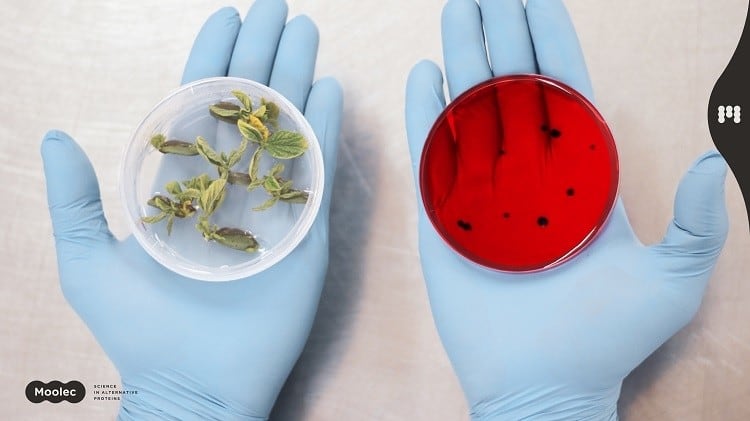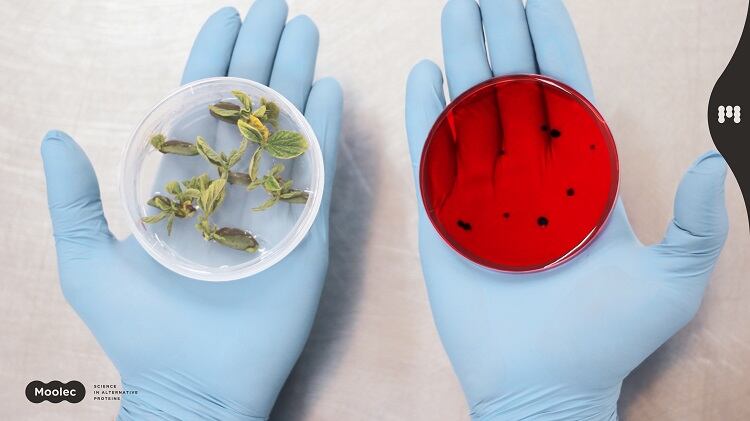UK-headquartered Moolec Science is developing animal-free proteins for the food industry. Its platform is founded on molecular farming: a hybrid concept that combines plant-based and cell-based technologies.
The Moolec team has experience using molecular farming for the cheesemaking industry and is working on plant-based functional ingredients for the meat analogue space.
This week, the company announced it is expanding its portfolio into plant-based beverages and bakery.
Molecular what?
Molecular farming describes the production of biomolecules and commercial products using plants, rather than bioreactors and fermentation.
In doing so, co-founders Gastón Paladini, Martín Salinas and Henk Hoogenkamp aim to improve the affordability of animal-free solutions in the food supply chain.
During lockdown, the founders have been focusing on soy and pea crops to create unique blends of functional proteins from bovine and porcine origins. The proteins, selected based on their specific functionality, will ultimately target manufacturers of meat analogues.
Although a cell-based solution, Moolec stressed its products are completely animal-free. “No animal cells were harvested and there is no need to do it,” explained CEO Paladini. “The proteins we are expressing can be found in animal-based food products, but we are simply using the plant cells to produce a specific protein by giving it the right instructions.
“The specific code of instructions determines which protein is expressed by the plant cell. The instructions are based on publicly available information on the target animal’s genetic information.”
When FoodNavigator caught up with the agri-food tech back in November 2020, we were told that dairy and egg alternatives were out of scope, but ‘not totally off the board’. “It depends what we stumble across in our research,” revealed CPO Hoogenkamp.
Less than four months on, and it appears the Moolec team has made some significant breakthroughs: its pipeline has since broadened to include products based on oat and ovum protein.
Expanding dairy protein portfolio
Moolec is leveraging the ‘increasing utilization’ of oat protein in the alternative dairy space for the plant-based beverage market.
Specifically, the ag-food tech is functionalising oat concentrates with co-expressed whey protein.
“The initial focus for our dairy replacement solutions will be to target the plant-based beverage market,” Paladini told this publication. “More specifically, we will develop solutions to enhance the nutritional properties of the plant-based dairy beverage segment whilst trying to minimise impact on the cost for the consumer.
“We will focus on the beverage market because we are convinced that a better nutritional profile will lead to widespread usage in both developed and developing nations,” said Hookenkamp.

Alongside Moolec’s move into egg alternatives, the expansion into dairy was a ‘natural step’ for the company’s roadmap.
“We can move into different directions because we use molecular farming technology as our main platform, through which we can express different animal proteins in virtually any crop,” explained Paladini.
“We develop science for the whole ecosystem, building integral solutions with focus on functionality, nutrition and organoleptic properties. We firmly believe that currently all technology based on molecule farming can find white space, even in market segments currently dominated by other alternative protein technologies.”
Egg alternative for bakery
In the egg alternative space, Moolec’s ovum protein is being engineered into wheat. The egg replacement is being specially designed for the bakery industry.
FoodNavigator asked the ag-food tech if its ovum protein will compete with JUST, Inc’s egg alternative product, JUST Egg. The main source of protein in JUST’s liquid egg replacement comes from the mung bean.
“The protein expressed in our product will have the same functionality, and will in that sense compete with JUST’s egg product,” explained Hoogenkamp. “However, we actually believe that we will be complementary to visionary companies like JUST because we are trying to help them achieve a lower price point by making use of the world’s most efficient bioreactors: plants.”

By using this approach, Moolec says it will be able to access markets that cannot afford premium ingredients produced by precision fermentation. “So, in this way, we are not competing, because we are growing the size of the plant-based pie and not competing for the slices.
“We are a B2B company looking to contribute with B2C companies to offer the optimal journey and proper affordability for consumers, seeking to build a more resilient, equitable and sustainable food system together.”
Bringing novel proteins to market
Moolec’s novel proteins will require regulatory approval before going to market. The firm revealed it is eyeing the US market first-off.
However, CTO Salinas suggested many countries can benefit from molecular farming technology, and that regulatory barriers will need to come down if we are to ensure food security in the coming years.
“We are committed to improving food security for the entire world by helping speed up the protein transition to rely on plants only,” he told this publication.
“Many countries around the world can help their local populations by adopting molecular farming technologies, and as such, regulatory approaches and local legislations will need to change to embrace technologies that can contribute to overcome the world’s most urgent challenges such as hunger, nutritional deficiency, animal welfare and environmental collapse.”



